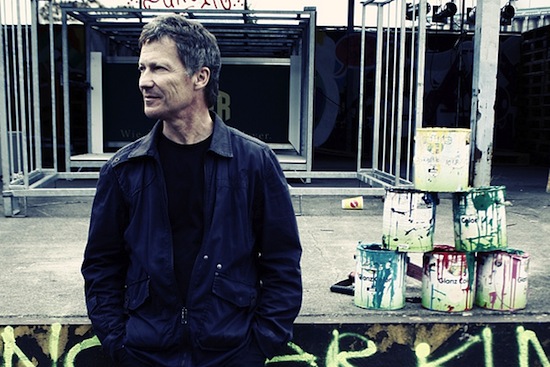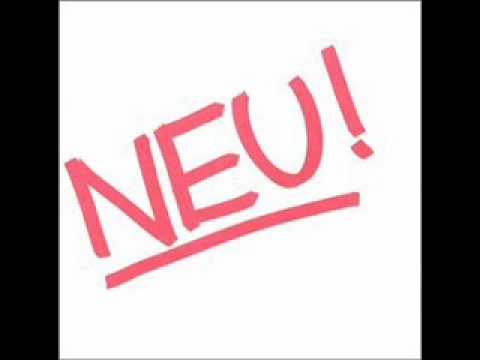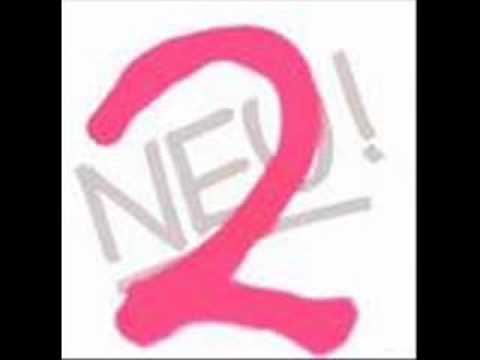A few weeks ago, we asked Michael Rother to take part in our Baker’s Dozen feature, and nominate 13 albums he really loved. He responded with surprising honesty. He couldn’t do that.
The man who spent his childhood soaking up musical influences in Germany, England and Pakistan as his father travelled the world with his job at Lufthansa, who formed Kraftwerk’s early backbone, who revolutionised the idea of what rock could be with Neu! and Harmonia, who has played with bands as varied as Sonic Youth and the Red Hot Chili Peppers, didn’t like to listen to albums much any more. In fact, he didn’t really like to listen to music at all.
What he wanted to talk about was silence, and so we did that. Sssssssh! Quiet at the back.
When you say you enjoy silence, what you mean? A complete lack of sound?
Michael Rother: No, I mean the absence of noise in our modern society. And the absence of music, involuntary listening to music. That’s something I really enjoy. And of course I think many people feel the same, because there’s a sort of sound pollution in all our lives – too many ringtones, too many channels calling for attention. So whenever I have the chance, I really try to enjoy silence, or soft sounds. I was in my country home over the weekend, which is in the beautiful landscape of Forst – you may know the name, it’s where Harmonia started – and I still live there most times of the year, and it was so striking to listen to the ambience.
But you also live in Hamburg, don’t you? Which is an incredibly busy city…
MR: It is, and I love being in cities like Hamburg, and having all the advantages of [being in] a modern capital. But what you hear in the city – you always have this flow of noise. It’s like audio technology in the old days, when you had the problem of hiss and noise on recordings, which was suppressed by Dolby and other means. If you really concentrate on listening to what you hear in the city, even in quiet times, you will notice that there’s a constant stream of it. I mean, I’m not talking about New York, Manhattan, where you go crazy. [laughs] I remember being in New York in my hotel room for the first time, trying to sleep, with not only the jet lag jumping at me, but also the constant noise coming up from the streets: the sirens, police sirens, the cars… it’s much more soothing, and much more calming for the nervous system, to be able to stand outside and just listen to natural sounds like the wind in the trees. Also the ability to distinguish different sounds, even sounds which are in the distance, which are sounds that invite you to follow them, is very important, I think. Like birds singing. It’s something I really enjoy.
Is this something you’ve always enjoyed? Going back to your work in the 1970s, especially with Neu!, your music still had a sense of space within it… but its mode was one of repetition and energy and a pulse… a quite urban music, really.
MR: Well, it’s difficult really to incorporate silence in the music, but the feeling of space and continuous motion I’ve always liked… I mean, it’s a reduction of information in a way, which is also interesting and is important to me. That’s what I started to do when I moved away from the music that I’d grown up with, in the late 60s/early 70s, when I started with Kraftwerk. That was my state of mind, my idea. I wanted to leave behind all this, what is it… heavy luggage, and the idea of there being too much information in music, and the idea of melodies and harmonies being used without meaning.
So, to give meaning to each single note or as much as possible is something that has been important to me since the early 70s – if you are with me! I’m not sure if I’ve succeeded, but I’ve tried to avoid just babbling around.
It’s about stripping music back to what’s important and essential in a way.
MR: It’s the same when you talk and you have to listen – it’s important to listen to what other people are saying and really pay attention. It’s about concentration, really. That’s right! I love being concentrated. [laughs] And that’s also why I love to watch snooker on television!
Really?
MR: Yeah, some friends laugh at me. I can watch snooker for hours, because it’s a sort of – for me at least – meditational process, where I can really concentrate, focus.
God, I used to as a child too, actually. My grandfather used to have it on, and I’d love hearing the sounds… the hush of the crowd, the putt-putt of the ball going in the pocket.
MR: Exactly! And also, to, you know, to follow what is happening, to try and imagine which would be the next step, the next ball to focus on… it’s a reductional process to sit and watch snooker. I also sometimes play it, not regularly, as mostly I play carambolage, billiards or pool. But also I play snooker, which really makes you very humble!
Talking about silence in music, were you ever influenced by any of the mid-20th-century experimental composers? Obviously, and famously, there’s John Cage’s 4’33". There’s also the Monotone-Silence Symphony by Yves Klein, conceived in the late 1940s.
MR: I was never educated in that kind of musical field, really. I jumped more or less right from rock ‘n’ roll, beat and rock music into what I’m doing now. Of course, I had some influence like through some of my collaborators – like Roedelius [who worked with Rother in Cluster and Harmonia], who would be a much more able, better person for you to talk to about those composers. But the idea of repetition was the thing that got me, which I remember already fascinating me when I was a small child. This is a nice story, and I think it may have some meaning: I remember my mother had a story which she had to tell me over and over again, which had no beginning and no end, which went on in a circle. And I tried to find the beginning, because I was so fascinated, listening again and again. I’m not sure if I’m getting the message across…
It was a story that went straight back to the beginning when it came to an the end – like a song that’s in a round, almost.
MR: Yes! And you don’t really understand that as a child. So the idea of repetition seems to have had an appeal to me from a very young age, a very important age.
Brian Eno worked with your supergroup with Dieter Moebius and Roedelius, Harmonia, in 1976. This was not long after his 1975 album, Discreet Music. Did his ambient work have any influence on you?
MR: To be quite honest, I tried to avoid being influenced by other music. You know, that was necessary for me to be able to focus on creating something individual, something unique. I mean, I know unique is a big word, so it’s just the idea I’m talking about, the wish to be as individual as possible. Even if it’s an intellectual process, it’s good to try to steer away from former heroes and musical visions that have inspired you. For me, that would have been people like Jimi Hendrix or The Beatles, when they came around. But there is no button to erase those experiences in your mind. You still remember everything, even when you try to forget. But to help, I don’t listen to music at home.
Have you trained yourself to listen to silence in any way?
MR: I think you are putting too much weight on that. But I guess I do try to… it’s a state of mind, of being, you know, to be open and be concentrating at the same time. But whenever the pressure from outside goes away, you know, the senses open up. I mean, if you’re standing next to a screaming machine, you try to shut down your nervous system as much as you can, but you can’t. But if you do… suddenly there are so many beautiful sounds. Like you suddenly hear some bells from, you know, five kilometres away, or over the hills and through the valley, or voices. It’s easy to forget that there are so many simple sounds to enjoy.
Do any pieces of music produce the same effect in you?
MR: I could only say that there are a few pieces of music which more or less always have a very positive effect on me… the piano pieces of Johann Sebastian Bach, for instance. In his work, you can really follow the meaning of individual notes. Or Indian raga classical music. That’s like medicine for me. I don’t want be too dramatic, but when my nerves get really in a bad state, they’re bound to save me!
So much recorded music these days is technologically compressed. Do you think that something has been lost along with this compression? Is quality of listening important to you in this way?
MR: That’s a tricky question, really. For me, it’s not so important on which media I hear the great music, as long as the message of the music comes across. It can be on a cassette player, it can be MP3, it can be on vinyl, on CD. Some of my colleagues and I have these sorts of discussions. They have the idea that you lose the meaning with the quality of sound, and I always answer, "concentrate on the meaning, on the sense. Don’t worry too much about the reduction in data or that kind of thing". But then again, it is pure joy if you listen to wonderful music played on a wonderful sound system, or in a wonderful place. I remember last year, I went to a concert in the interior of a castle in a small city near Forst and I heard Mozart, and Johann Sebastian Bach played on brass. The sound!
Then again though, it’s strange that I’m talking about non-pop music here. I don’t want to create a wrong impression – I sometimes really love very popular tunes. And I may risk my head by saying this, but I’ll compare it to liking food… recently when I played in Helsinki at a festival of food and music, there were some excellent chefs of cuisine. But sometimes, you know, I also like the curry. [laughs] Some of my friends would frown at that, or say, “OK, this Lady Gaga or whatever”, in a ridiculous way. But Lady Gaga is also enjoyable. You can enjoy very different kinds of music, and I do, but I always like to come back to silence.
But there’s no such thing as real silence, is there? Some musicians use anechoic chambers which completely absorb sound to get things as completely silent as possible.
MR: Oh God, complete silence will drive you crazy, of course. I think that our senses cannot cope with total silence, and it would be torture to deprive the victim of sensual information. That’s terrible, but it happens I guess. But if you heard no sound, I guess you would start listening to the blood rushing in your veins and start singing, then you would start singing to yourself or talking to yourself. Our brains need information. We need to use the senses.
But some people think removing ourselves from music for a little while would help. Over here in Britain in the last decade, Bill Drummond promoted a National No Music Day. Before him, Luke Haines proposed a National Pop Strike. Would you be up for those? [laughs] They will cause problems! [thinks] But not to listen for just one day… I would always prefer to try and focus, concentrate, every day, as much as possible. Not only one day per year or every five years. And if I did something similar, I wouldn’t stop at music. How about all the car noises on the streets and the machines and industrial noises? It wouldn’t be enough just to shut down the radio stations either. [thinks] But then again, a little bit of sugar is OK. [pauses] Only a little a bit though. That’d be my day. No listening to too much sugar!
Michael Rother presents the music of Neu! at Central Station, Wrexham, this Saturday, April 27, as part of the Focus Wales Music Festival




